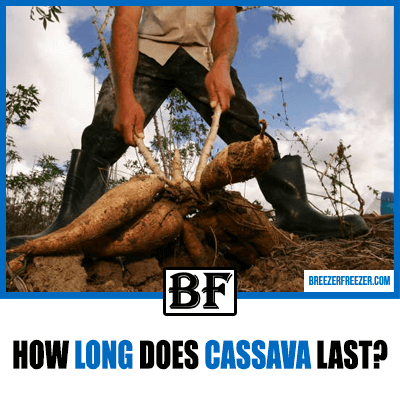How long does cassava last? How to keep these root vegetables fresh
Cassava is a root that has been widely used throughout the tropics and Africa for millennia. Cassava is an excellent source of energy and is packed with essential nutrients. The cassava tuber is versatile and can make fantastic dishes, from satisfying savory foods to sweet desserts. But as the rest of the world catches on to the benefits of eating cassava, there is a question to be answered. How do you store the tubers?

Did you know you have been eating cassava for years? Tapioca is made from cassava roots! Cassava is also known as yuca, not to be confused with Yucca!.
This article looks at how to store cassava roots to bring you the best information available. We answer frequently asked questions so you can use cassava root in your meals while keeping them fresh.
Let’s get into it.
Does cassava expire?

It does, and it can expire faster than you might have thought. If you are familiar with eating potatoes, you may expect cassava to have the same properties for storage, but cassava is not a potato and has less shelf life when it’s not prepared.
If the cassava is not processed, the cassava root starts to spoil in what is known as the post-harvest physiological deterioration or (PPD)1.
Other factors shorten the life cycle of cassava Roots. The roots are damaged during manual harvesting, which shortens their shelf life.
Cassava variants frequently have asymmetrical shapes. These factors, along with farmers’ sloppy harvesting techniques, cause the roots to be sliced, shortening their life cycle.
It is challenging to harvest cassava without harming it with manual methods. However, with cassava being grown in the US, the system will be automated and address these issues.
You can store cassava in your pantry or garage if it’s cool and airy for up to 72 hours unprocessed.
Cooked cassava fairs are better for storage and will last a week before it turns bad.
However, there is more than one way to cook cassava, and you may have seen cassava chips in the grocery store. They can last much longer. Unopened Cassava chips can last up to 80 days but sit in nitrogen.
Does cassava need to be refrigerated?

It depends on what condition the cassava is in. If the cassava is fresh and has not been processed, it should stay in a cool dark environment. If you place a decent fungicide over the root and wrap the cassava in plastic, the roots can last up to 1 month.
If the cassava has been peeled and sliced prior to cooking, it can be placed in a bowl of water in the fridge for a few days before cooking. It’s best to keep the cassava root cool after it’s processed.
Cooked cassava should be cooled, placed in an airtight container, and placed in the fridge. It will be suitable for a few days sealed this way.
Cassava cake, if not eaten, can be placed in an airtight container and stored in the fridge for a week. It will not deteriorate and will taste perfect.
Does cassava need to be covered?
It’s an interesting question, and the answer is yes, but only if you have used a fungicide to protect the roots. After applying fungicide to the roots, wrap them in plastic. The cassava should be good for a month in this condition.
If the cassava is peeled, ready for cooking, and placed in the fridge covered with cling film, it will help protect the cassava and the food in the fridge.
Once cooked, it’s imperative to cover the cassava. Once exposed to air, it oxidizes and discolors. Place cassava in an airtight container. It will store in the fridge for a week.
Can you put warm cassava in the fridge?

No, warm cassava or any warm food in the fridge will elevate the fridge’s temperature. It will take cassava some time to cool to an acceptable level, so placing it in the fridge will continue to radiate heat.
Your fridge may not be as efficient as you think at removing heat, and if the temperature in the fridge rises above 40℉, all of the food contained in the fridge will be in the food danger zone.
The food danger zone is when the temperature is between 40 and 140°F. At this temperature, bacteria will grow on your food, and after just a short two hours, the food will be considered dangerous to consume, according to the USDA.
Allow warm foods to cool to an acceptable level before placing them in the fridge.
How long can cassava sit out?
If you assume the cassava is cooked and ready to be served, cassava can sit out for two hours. This is the same as any other perishable food sitting out at room temperature.
The average room temperature is 68℉, almost in the middle of the food danger zone. Bacteria growth can accelerate exponentially, making the food unfit for consumption after just two hours, according to the USDA.
After two hours, cassava should be discarded. Eating it could be potentially dangerous and cause food poisoning.
How long does cassava last in the fridge?
Unpeeled cassava should not be stored in the fridge, there are no benefits, and it will store better in the garage or a cool, airy pantry.
Uncooked, it has a short shelf life. Cassava will last for around four days if prepared and sitting in water.
Boiled cassava will last in the fridge for a week if stored in an airtight container. Homemade cassava chips stirred in an airtight container like a Ziploc will last for two weeks if stored in the fridge.
Cassava cake again will last for a week if stored in an airtight container in the fridge.
Does frozen cassava go bad?
Any food stored at 0℉ should have an indefinite life in the freezer, but often freezing foods for an extended period does destroy them through freezer burn and general degradation of the product, like changes in texture and loss of flavor.
Cassava freezes well. Its structure is perfect for freezing, but the life in the freezer is relatively short. You can freeze raw peeled cassava for three months.
To do so, you will need to blanch the cassava for fifteen minutes or boil it if you prefer the term. After boiling, place the cassava in chunks in freezer bags and then freeze quickly at the lowest temperature setting.
Then freeze as usual for three months,m there should be no changes in texture as you would find if freezing potatoes.
How do you defrost cassava?
Defrost in the fridge overnight. It is possible to cook with frozen chunks of cassava, but you will need to ensure they are cooked through carefully. Raw cassava contains cyanide and is responsible for deaths in the African continent.
If you have frozen grated cassava, thaw it in the fridge overnight before cooking.
Is cassava poisonous?
When cooked and handled correctly, cassava is not harmful. The Philippines, Africa, and South America are just a few places where it is a staple food. There are sweet and bitter variants of hydrocyanic acid, which results in cyanide poisoning.
The bitter variety, which contains more acid, can be lethal if raw or undercooked. Before eating, it’s crucial to prepare them properly.
How do you remove cyanide from cassava?
Consuming raw cassava might make you sick because it contains cyanide in its natural form. Sweet varieties with reduced cyanide concentration eliminated by peeling and frying are typically offered in the US.
Before eating, bitter types must be soaked and boiled for several hours to eliminate the harmful cyanide.
It is unlikely that you would eat raw cassava, it is very dense, but thorough cooking is needed.
How do you know if the cassava is bad?
Look for any cracks or moldy odors while purchasing cassava. Cassava should have white meat throughout. The only way to see the flesh is to sever the cassava.
The cassava has gone bad if the flesh isn’t white and should be pulled from the shelves. The cassava is past its prime if you notice black specks, lines, or discoloration that runs throughout.
How can you keep cassava fresh for longer?
Most cassava coming into the US is imported and frozen, which makes for an easy life. The shelf life is generally three months, so check the product. If the shelf life is less, your storage time will be less.
But if it was frozen correctly. It should last in the freezer for three months, so keep an eye on the expiry date because it will diminish in quality.
Related:
- How long do Persimmons last?
- How long does dragon fruit last?
- How long does jackfruit last?
- How long does Zucchini last?
- How long does Tamarind last?
- How long does Jicama last?
- How long do mangosteens last?
- How long does Guava last? Tips to keep them fresh
- How long does Soursop last?
- How long does Lychee last?
- How long does Longan last?
- How long does custard apple last? Tips to keep them fresh longer
- How long do Mangoes last? Tips to keep them fresh
Final thoughts
Cassava is not like a potato. It’s very different and needs to be handled differently. Don’t be scared to handle fresh cassava. It’s easy if you follow simple rules such as not using a potato peeler, the skin is too tough, and cook thoroughly.
Cassava is a versatile root, and you can make some delightful dishes. They are yummy, like cassava cake, cassava chips, roasties, and the list goes on.
Cassava freezes well for up to 3 months. The fridge shelf life is less, so utilize frozen cassava if you are a busy household.





